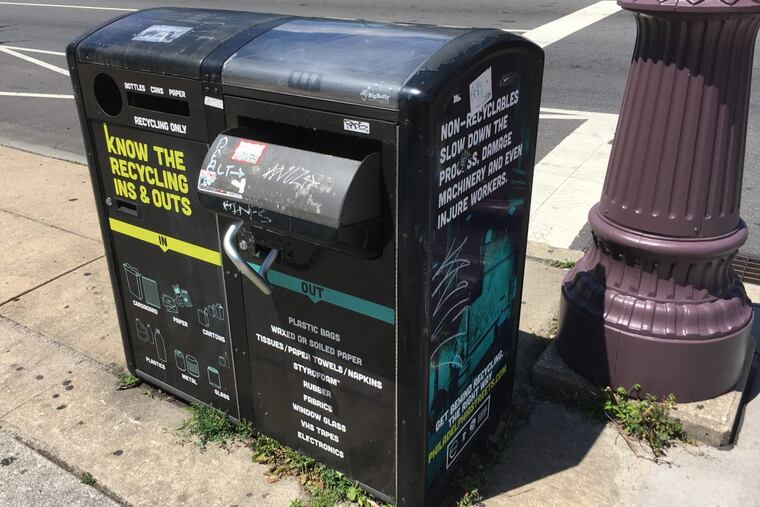Why high-tech trash cans didn't work
Had anyone road-tested the BigBelly, the flaws would have been obvious

Let's trash talk.
Yes, I know there are "bigger" issues — $500 million for rebuilding municipal assets, a lack of affordable housing, the trial of the D.A., the mistrial of America's Dad, the conviction of political heiress Renee Tartaglione – but street-corner trash cans are something we can get our heads around, even though we wouldn't touch one with a 7-foot Latvian, such as the one just acquired by the Sixers.
I'm talking about the flawed, high-tech, solar-powered trash compactors known as BigBelly that need replacement. The first 300 started hitting the streets in 2009 and Philadelphia now is the proud possessor of 975 of them, mostly in commercial corridors and Center City. The whole deal cost the city $4.5 million – at first, but there was more to come. http://www.philly.com/philly/news/politics/city/controller-says-high-tech-trash-cans-wasted-money-20170622.html
That's small potatoes in a $4 billion city budget, but it illustrates an annoying tendency on the part of some city officials to be blinded by shiny objects ("solar powered") and to backseat common sense. Is it possible no one road tested them as you would a car?
They looked all right, kind of like R2D2's older, bigger cousin, but anyone trying to use it immediately would have detected two flaws.
First, BigBelly has a handle to pull open its maw. Those handles soon became filthy – quite a surprise – and repulsive, especially to women who are more grime-averse than men. Does that sound sexist? Stick your head into a typical single guy's bathroom, if you dare.
Regarding the handles, Streets Commissioner Carlton Williams quoted citizens as saying, "We don't want to touch that thing."
Ah, but others did want to touch that thing — thieves who stole the aluminum handles and sold them for scrap. With no handle, BigBelly was on a starvation diet, inoperable.
Second, because BigBelly has a handle, throwing something into the can requires two hands – one to pull down the door, another to drop the object in. If you are carrying a purse, or a briefcase, or a cell phone, using BigBelly is a problem.
The high-tech things cost $3,700 each, as opposed to $100 each for the no-tech wire baskets which they replaced. BigBelly works off a 12-volt battery powered by a solar panel and reportedly holds five times more trash than wire baskets.
Busy ones overflowed anyway, and the technology that was to alert the Streets Department when they were nearing capacity often failed. The trash compactors broke down and the city needed a five-person squad dedicated to fixing that, an unforeseen expense.
In a cost analysis, city Controller Alan Butkovitz reported that when maintenance and parts were factored in, the trash compactors cost the city more like $6.5 million because of bad technology.
Not as bad as cell phones and hover boards that spontaneously burst into flames, but bad enough.
Even though a Butkovitz report waved a caution flag at the trash compactor program in 2010, it took another seven years for city to attempt to fix the problem.
It did that last week when City Council approved a deal to bring in 275 new, improved trash compactors.
Two big positives: the new ones will have a foot pedal for opening the door, and the city will get them free in exchange for advertising rights. The new deal also will outsource some of the maintenance work.
"Basically it's an acknowledgment that the city's role for the last seven years hasn't worked," said Butkovitz, who is seen as a possible mayoral candidate in 2019.
Williams said while the city initially claimed the trash compactors would save the city $13 million in personnel costs over 10 years, the actual savings has been half that – $6.4 million – because of the high maintenance costs.
When the new trash compactors arrive, Williams said, some of the existing ones can go into neighborhoods and other commercial corridors.
Streets is looking to retrofit them with foot pedals.
Let's be real. Without foot pedals you're just relocating the problem to the neighborhoods, offering them something they'd rather not touch, not even with a 7-foot Latvian.